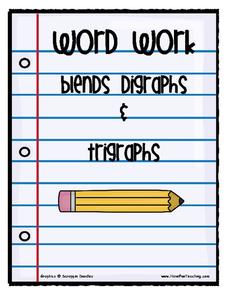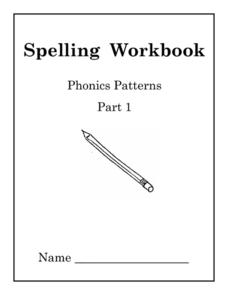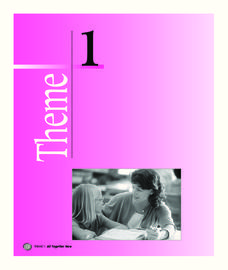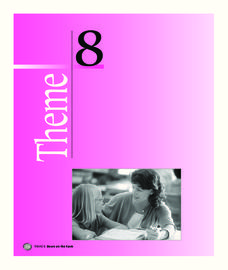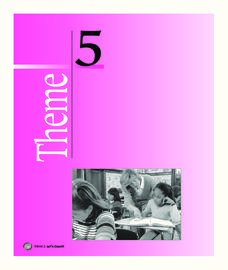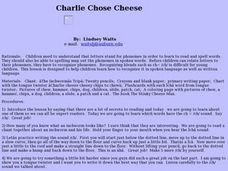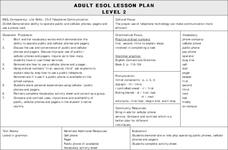Have Fun Teaching
Word Work: Blends, Digraphs & Trigraphs
Practice thirty-three different consonant blends, digraphs, and trigraphs with your emergent readers! Each letter combination has its own column in which you and your learners can write down five different words that demonstrate the...
Curated OER
Matching Consonant Blends Worksheet
In this consonant blends worksheet, learners match the beginning consonant blend with the picture whose name uses it. Students complete 5 matches.
Houghton Mifflin Harcourt
We’re a Family: Extra Support Lessons (Theme 3)
Pay special attention to onsets and rimes and initial consonants with this packet of activities designed to provide additional support to youngsters just learning to read and write.
Houghton Mifflin Harcourt
Friends Together: Extra Support Lessons (Theme 4)
Friendship is the theme in this series of extra support lessons. With a variety of resources (practice worksheets, letter, word, punctuation and picture cards), young readers gain knowledge of initial consonants v and h, blending short...
Curated OER
Final Consonant Sounds: Review - ft, ld, lt, mp, nd
These are challenging phonics review sheets. On the first page, learners match the end sounds to the pictures and write a rhyming word for each word. For the second page, pupils choose an end sound to complete a series of incomplete...
Curated OER
Beginning and Ending Blends - ch, sh, and th
In this spelling and grammar learning exercise, students work with the beginning and ending blends, ch, sh, and th. They fill in the blanks with blends while naming 7 clip art pictures, and they add the blends to the beginning of 9 words.
Kathryn J. Davis
Spelling Workbook: Phonics Patterns
Set your pupils straight with spelling and sounds by using these materials for practice. Included here are three booklets and workbooks that cover just about any sound or blend you could think of!
Core Knowledge Foundation
Kindergarten Skills Unit 7
A unit consists of seventeen lessons that examine six new consonant digraphs. Lessons review past concepts, introduce sounds and spelling, and offer differentiated instruction in small groups. Learners begin reading a decodable story and...
Houghton Mifflin Harcourt
All Together Now: Extra Support Lessons (Theme 1)
All Together Now is the theme of this series of extra support lessons. The collection aids the instruction of blending sounds and reading high-frequency words through writing and reading sentences. Support also engages pupils in...
Houghton Mifflin Harcourt
Down on the Farm: Extra Support Lessons (Theme 8)
Chants, rhymes, practice pages, picture, word, and punctation cards provide extra support for reading high-frequency words, substituting, blending, segmenting, and identifying phonemes in this Down on the Farm themed unit.
Houghton Mifflin Harcourt
Family and Friends: Extra Support Lessons (Theme 4)
Family and Friends is the theme of a unit offering extra support lessons. Follow each lesson plan's teach, blend, guided practice or practice/apply routine to reinforce concepts such as clusters, responding to reading, drawing...
Houghton Mifflin Harcourt
Let’s Count!: Extra Support Lessons (Theme 5)
In a themed series of lessons and activities, beginner readers are given extra support in reading through chants, games, and practice worksheets.
Houghton Mifflin Harcourt
Down on the Farm: English Language Development Lessons (Theme 8)
Down on the Farm is the theme of this series of ESL lessons designed to support reading, speaking, and listening skills. Over three weeks, your learners will have the opportunity to sing songs, play guessing games, create masks, role...
Houghton Mifflin Harcourt
Let’s Count!: English Language Development Lessons (Theme 5)
Counting is the theme of this compilation of ESL lessons. Through listening, speaking, and moving, your young learners take part in a variety of activities to enhance their English proficiency such as making menus and books,...
K5 Learning
I Have Been Thinking…
Scholars read a short story about a girl visiting her grandmother, identify the main idea of the tale, and then write a sentence about this idea. Learners practice their phonics skills by filling in word blanks with letters to complete...
Curated OER
Charlie Chose Cheese
First graders identify the digraphs in written and spoken language. After a brief discussion of the combinations of /c/ and /h/ that comprise th /ch/ digraph, 1st graders practice identifying initial and final placement of the digraph...
Curated OER
Choo Choo Train
Students identify the digraphs in written and spoken language. After a brief discussion of the combinations of /c/ and /h/ that comprise th /ch/ digraph, students practice identifying initial and final placement of the digraph /ch/ in...
Curated OER
ADULT ESOL LESSON PLAN--Literacy/Foundations--LCP A
Students, after reviewing a variety of vocabulary terms, examine how interpersonal communication effects cultures everywhere. They analyze how to respond and give polite expressions to others in conversations.
Curated OER
Telephone Communication
Students role-play telephone conversations. They view a video of a telephone conversation and discuss the vocabulary used during the conversation. They practice conversations and substitute responses.
Curated OER
ESOL Telephone Communication
Students discuss the use and convenience of public and cellular phones and how to use them. They compare and contrast uses, importance and availability of public, cellular phones and pagers in the student's native country.


